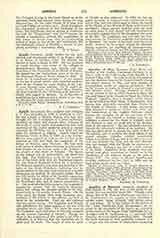

Agnellus of Pisa, BLESSED, Friar Minor and founder of the English Franciscan Province, b. at Pisa c. 1195, of the noble family of the Agnelli; d. at Oxford, May 7, 1236. In early youth he was received into the Seraphic Order by St. Francis himself, during the latter’s sojourn in Pisa, and soon became an accomplished model of religious perfection. Sent by St. Francis to Paris, he erected a convent there and became custos. Having returned to Italy, he was present at the so-called Chapter of Mats, and was sent thence by St. Francis to found the Order in England. Agnellus, then in deacon’s orders, landed at Dover with nine other friars, September 12, 1224, having been charitably conveyed from France by the monks of Fecamp. A few weeks afterwards they obtained a house at Oxford and there laid the foundations of the English Province, which became the exemplar for all the provinces of the order. Though not himself a learned man, he established a school for the friars at Oxford, which was destined to play no small part in the development of the university. But his solicitude extended beyond the immediate welfare of his brethren. He sent his friars about to preach the word of God to the faithful, and to perform the other offices of the sacred ministry. Agnellus wielded considerable influence in affairs of state, and in his efforts to avert civil war between the King and the Earl Marshal, who had leagued with the Welsh, he contracted a fatal illness. Eccleston has left us a brief account of his death. Agnellus’s body, incorrupt, was preserved with great veneration at Oxford up to the dissolution of the religious houses in the time of Henry VIII. The cultus of Blessed Agnellus was formally confirmed by Leo VIII in 1882, and his feast is kept in the Order on May 7.
STEPHAN M. DONOVAN

